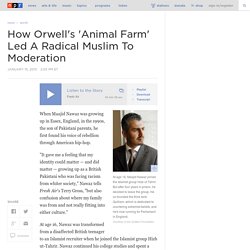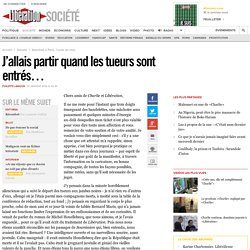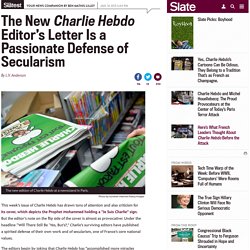

« Notre société a produit ce qu’elle rejette aujourd’hui comme une monstruosité infâme » Par Didier Fassin, professeur de sciences sociales à l’Institute for Advanced Study de Princeton (New Jersey) Après le temps de la sidération, le temps de la communion et le temps du recueillement autour des victimes des assassinats des 7, 8 et 9 janvier, devra venir le temps de la réflexion sur ces événements tragiques.

Or l’émotion légitime et l’apparent consensus qui en a résulté tendent à délimiter l’espace du pensable et a fortiori du dicible. Un périmètre de sécurité idéologique impose ce qu’il est acceptable d’interroger et ce qui ne saurait l’être. Condamner est nécessaire, analyser devient suspect. « Il y en a assez de toujours essayer de comprendre. À force de trop vouloir expliquer, nous avons fait preuve de complaisance depuis trop longtemps », me disait une personnalité de gauche connue pour ses engagements citoyens. . « Excuses sociologiques » How Orwell's 'Animal Farm' Led A Radical Muslim To Moderation. At age 16, Maajid Nawaz joined the Islamist group Hizb ut-Tahrir.

But after four years in prison, he decided to leave the group. He co-founded the think tank Quilliam, which is dedicated to countering extremist beliefs, and he's now running for Parliament in England. Courtesy of the Quilliam Foundation hide caption itoggle caption Courtesy of the Quilliam Foundation At age 16, Maajid Nawaz joined the Islamist group Hizb ut-Tahrir. Courtesy of the Quilliam Foundation When Maajid Nawaz was growing up in Essex, England, in the 1990s, the son of Pakistani parents, he first found his voice of rebellion through American hip-hop.
The Charlie Hebdo shootings explained to my American Friends. “What is the reaction of the Muslim community ?” , is one of the question I see a lot, both from Americans who think Muslims should speak louder against terrorism and from people who are afraid of the rise of anti-Muslim sentiment. There are between 5 and 6 million of Muslims in France. Ten percent think of themselves as a “mosque goer” on a weekly basis. But they don’t form a consistent community. It is important to understand that Muslims in France are immigrants or sons of immigrants coming from different parts of the Muslim world: Algeria, Turkey, Mali, the Comoros, etc. They bring with them different forms of Islam, coming from different school of thoughts and traditions. And as Sunni Islam has no official clergy or equivalent of a Pope, the French government has spent the last 20 years building a French institution to represent French muslims, the CFCM (the French Council for Muslim Religion).
These attacks hurt French Muslims too. « Evidemment, je suis contre le terrorisme, mais pas davantage en faveur de ces caricatures » Philippe Lançon: «J’allais partir quand les tueurs sont entrés…» Chers amis de Charlie et Libération, Il ne me reste pour l’instant que trois doigts émergeant des bandelettes, une mâchoire sous pansement et quelques minutes d’énergie au-delà desquelles mon ticket n’est plus valable pour vous dire toute mon affection et vous remercier de votre soutien et de votre amitié.

Je voulais vous dire simplement ceci : s’il y a une chose que cet attentat m’a rappelée, sinon apprise, c’est bien pourquoi je pratique ce métier dans ces deux journaux – par esprit de liberté et par goût de la manifester, à travers l’information ou la caricature, en bonne compagnie, de toutes les façons possibles, même ratées, sans qu’il soit nécessaire de les juger. Charlie Hebdo: The new issue’s editor’s note is a defense of secularism. Photo by Aurelien Meunier/Getty Images This week’s issue of Charlie Hebdo has drawn tons of attention and also criticism for its cover, which depicts the Prophet Mohammed holding a “Je Suis Charlie” sign.

But the editor’s note on the flip side of the cover is almost as provocative: Under the headline “Will There Still Be ‘Yes, But’s? ,” Charlie’s surviving editors have published a spirited defense of their own work and of secularism, one of France’s core national values. The editors begin by joking that Charlie Hebdo has “accomplished more miracles than all the saints and prophets combined” in the last week—chief among them putting out a newspaper despite losing eight of their staffers to a terrorist attack. The editors then thank everyone who has supported them, those “who are truly on our side, who sincerely and deeply ‘are Charlie.’ ” And to those who aren’t: “We say fuck you to the others, who don’t give a shit anyway.”